Italian garden design represents centuries of refined elegance, blending classical Renaissance principles with Mediterranean charm. These timeless landscapes originated in the rolling hills of Tuscany and the grand villas of Rome, where symmetrical terraces, evergreen structures, and flowing water features created outdoor sanctuaries. From formal parterre gardens adorned with boxwood hedging to rustic courtyards filled with terracotta pots and climbing vines, Italian gardens emphasize harmony between architecture and nature. Whether you're planning a sprawling estate or an intimate patio, these design concepts celebrate outdoor living through carefully curated plants, natural stone pathways, and sculptural elements that capture the romantic spirit of Italy.
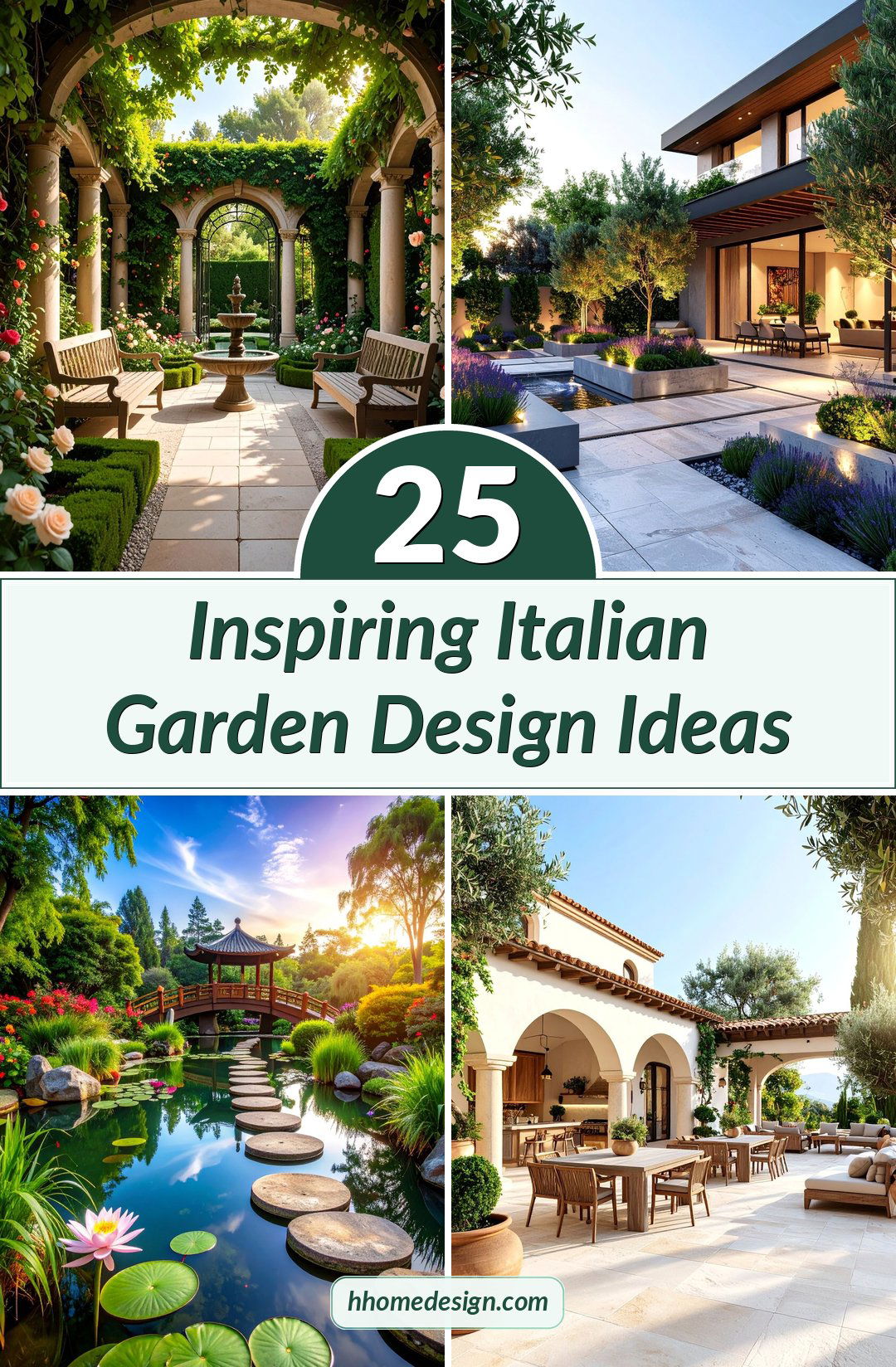
1. Formal Renaissance Garden with Geometric Parterre

The formal Renaissance garden style epitomizes Italian sophistication through precise geometric patterns and symmetrical design. Central parterre beds feature intricate boxwood hedging arranged in elaborate knots and swirls, creating living artwork viewed from elevated terraces or upper-story windows. Gravel pathways intersect at perfect right angles, leading to central fountain features or classical statuary. Evergreen topiary spheres and cones punctuate each corner, while Italian cypress trees provide vertical drama along the garden's perimeter. This design emphasizes human control over nature through mathematical precision, with carefully maintained lawns, clipped hedges, and orderly plant arrangements that reflect the intellectual ideals of the Renaissance period.
2. Tuscan Hillside Terrace Garden with Olive Groves

Tuscany's sloping landscapes inspire this terraced garden design that transforms challenging slopes into productive beauty. Stone retaining walls create multiple levels, each hosting different garden functions from herb cultivation to dining areas. Ancient olive trees anchor each terrace with their distinctive silver-green foliage and gnarled trunks, providing both shade and culinary bounty. Warm-toned flagstone pathways connect the levels, while traditional dry-stone walls support Mediterranean plantings of lavender, rosemary, and wild thyme. Terra cotta urns filled with seasonal blooms add color accents, and a rustic pergola crowns the highest terrace, offering panoramic views of the garden below and creating an ideal spot for al fresco dining.
3. Mediterranean Courtyard with Central Water Fountain

This enclosed courtyard design captures the intimate charm of Italian villa life through carefully proportioned spaces centered around flowing water. High stone walls provide privacy while supporting climbing jasmine and wisteria that soften the architecture with fragrant blooms. The central tiered fountain serves as both focal point and cooling element, with water cascading through carved stone basins surrounded by geometric planting beds. Potted citrus trees in large terracotta containers can be moved seasonally, while permanent plantings of boxwood, bay laurel, and myrtle create year-round structure. Comfortable seating areas tucked into vine-covered alcoves invite contemplation, making this design perfect for urban settings requiring privacy and tranquility.
4. Pergola Garden with Climbing Vines and Dining Space
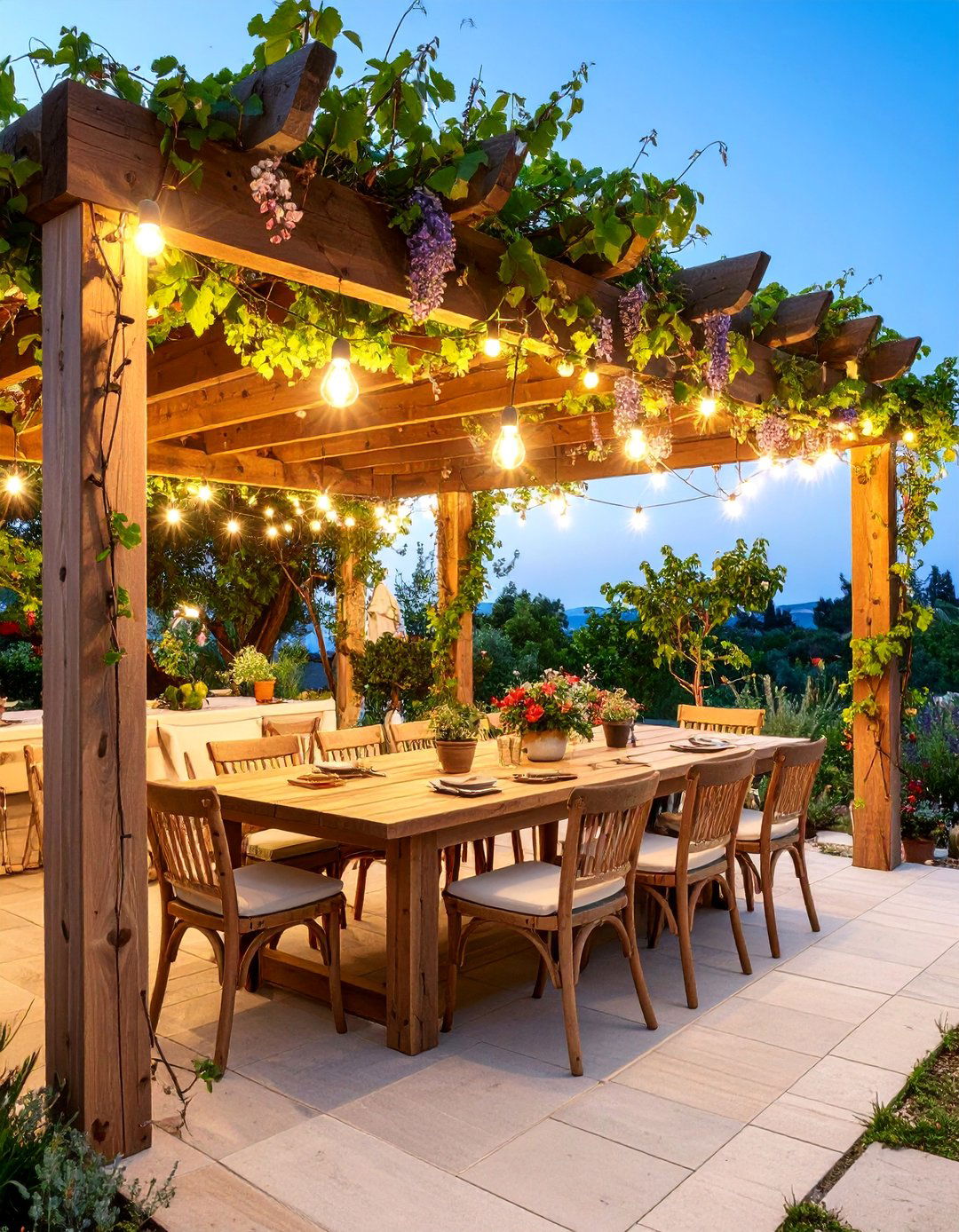
The pergola garden embodies Italian outdoor living philosophy by creating shaded dining areas beneath flowering canopies. Sturdy wooden or stone columns support overhead beams draped with vigorous climbing plants like wisteria, grape vines, or fragrant jasmine that provide natural air conditioning and seasonal beauty. Long wooden tables accommodate large gatherings, surrounded by rustic chairs and benches that encourage lingering conversations. Herb gardens planted nearby supply fresh ingredients for outdoor cooking, while string lights create magical evening ambiance. Stone or gravel flooring defines the dining area, with planted borders featuring Mediterranean favorites like lavender, rosemary, and sage. This design transforms any garden into an extension of indoor living spaces.
5. Secret Garden Room with Boxwood Hedging
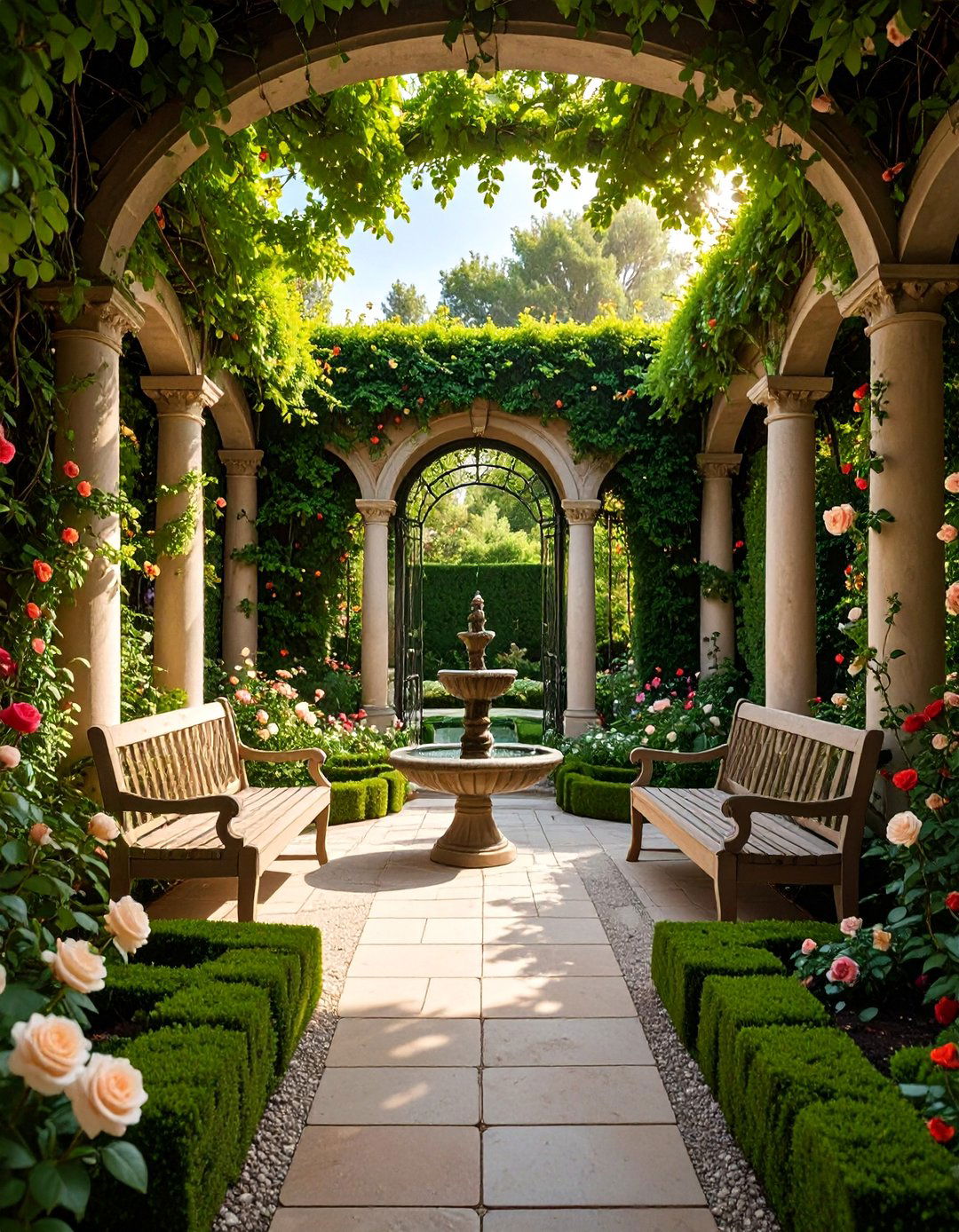
Drawing inspiration from Renaissance giardino segreto traditions, this intimate garden room offers private retreat within larger landscapes. Dense boxwood hedging creates living walls that completely enclose the space, accessed through a single ornate gate or archway. Inside, a simple fountain or sculpture provides a central focal point, surrounded by carefully maintained gravel paths and planted borders. Climbing roses or jasmine trained on interior walls add vertical interest and seasonal fragrance, while a single bench or pair of chairs invites quiet contemplation. The monochromatic green palette emphasizes texture and form over color, creating a serene sanctuary that feels removed from the outside world despite its accessible location.
6. Gravel Garden with Architectural Plant Forms

This drought-tolerant design celebrates the sculptural qualities of Mediterranean plants through minimalist hardscaping and bold plant forms. Pale gravel surfaces replace traditional lawns, creating neutral backgrounds that highlight the dramatic silhouettes of Italian cypress, olive trees, and architectural agaves. Large terracotta vessels serve as focal points, planted with single specimens like bay laurel or rosemary trained into topiary forms. Natural stone stepping stones provide pathways while maintaining the garden's serene simplicity. Ornamental grasses add movement and texture, while carefully placed boulders create visual weight and naturalistic accents. This contemporary interpretation of Italian design principles works exceptionally well in modern settings while requiring minimal water and maintenance once established.
7. Villa Garden with Stone Balustrades and Urns

Inspired by grand Italian villa traditions, this elevated garden design emphasizes architectural elements and sweeping views. Stone balustrades define terraced levels and walkways, supporting classical urns overflowing with seasonal plantings that change throughout the year. Wide staircases connect different garden levels, flanked by sentinel cypress trees or clipped bay laurel specimens in formal arrangements. Ornate carved stone details on balustrades and urns reference classical mythology and Italian artistic heritage, while the elevated positioning allows for dramatic vistas across the garden and surrounding landscape. Formal plantings of evergreen shrubs provide year-round structure, complemented by carefully controlled seasonal color from roses, geraniums, and other Mediterranean flowering plants that celebrate Italian garden traditions.
8. Herb Garden with Culinary Focus and Terra Cotta Planters

This practical yet beautiful design celebrates Italy's renowned culinary tradition through organized herb cultivation in decorative containers. Large terracotta pots of varying sizes create an informal arrangement near outdoor kitchens or dining areas, filled with essential Italian herbs like basil, oregano, sage, and rosemary. Raised planting beds constructed from local stone provide permanent homes for larger specimens, while smaller pots allow for seasonal rotation and easy harvesting. A central path of worn brick or stone connects different herb zones, with comfortable seating nearby for processing and enjoying the harvest. Climbing vines on nearby walls or structures provide vertical growing space for beans and tomatoes, creating a productive garden that supplies fresh ingredients while maintaining aesthetic appeal.
9. Water Garden with Reflecting Pools and Aquatic Plants

Drawing from Renaissance water garden traditions, this design showcases the cooling and meditative qualities of still water features. Formal rectangular or circular pools reflect sky and surrounding plantings while supporting aquatic gardens of water lilies, lotus, and marginal plants. Stone coping and decorative bridges provide viewing platforms and transition elements between water and land areas. Surrounding borders feature moisture-loving plants like iris, astilbe, and ferns that thrive in the humid microclimate created by large water bodies. Classical statuary or simple fountains add vertical interest without disturbing the peaceful surface reflections. This design works particularly well in warm climates where the cooling effect of water provides both psychological and physical relief from intense heat.
10. Modern Italian Garden with Contemporary Materials and Clean Lines

This updated interpretation maintains Italian design principles while embracing contemporary aesthetics and materials. Geometric forms created with steel edging, concrete planters, and precision-cut stone surfaces provide structure for Mediterranean plant selections including olive trees, lavender, and ornamental grasses. Water features utilize modern materials like weathering steel or polished concrete while maintaining classical proportions and placement principles. Simplified plant palettes emphasize form and texture over complex color schemes, with strategic lighting highlighting architectural plants and hardscape elements for evening enjoyment. Outdoor furniture features clean lines and natural materials that complement rather than compete with the landscape design, creating spaces that feel both timelessly Italian and thoroughly contemporary.
11. Citrus Grove Garden with Potted Trees and Seasonal Display
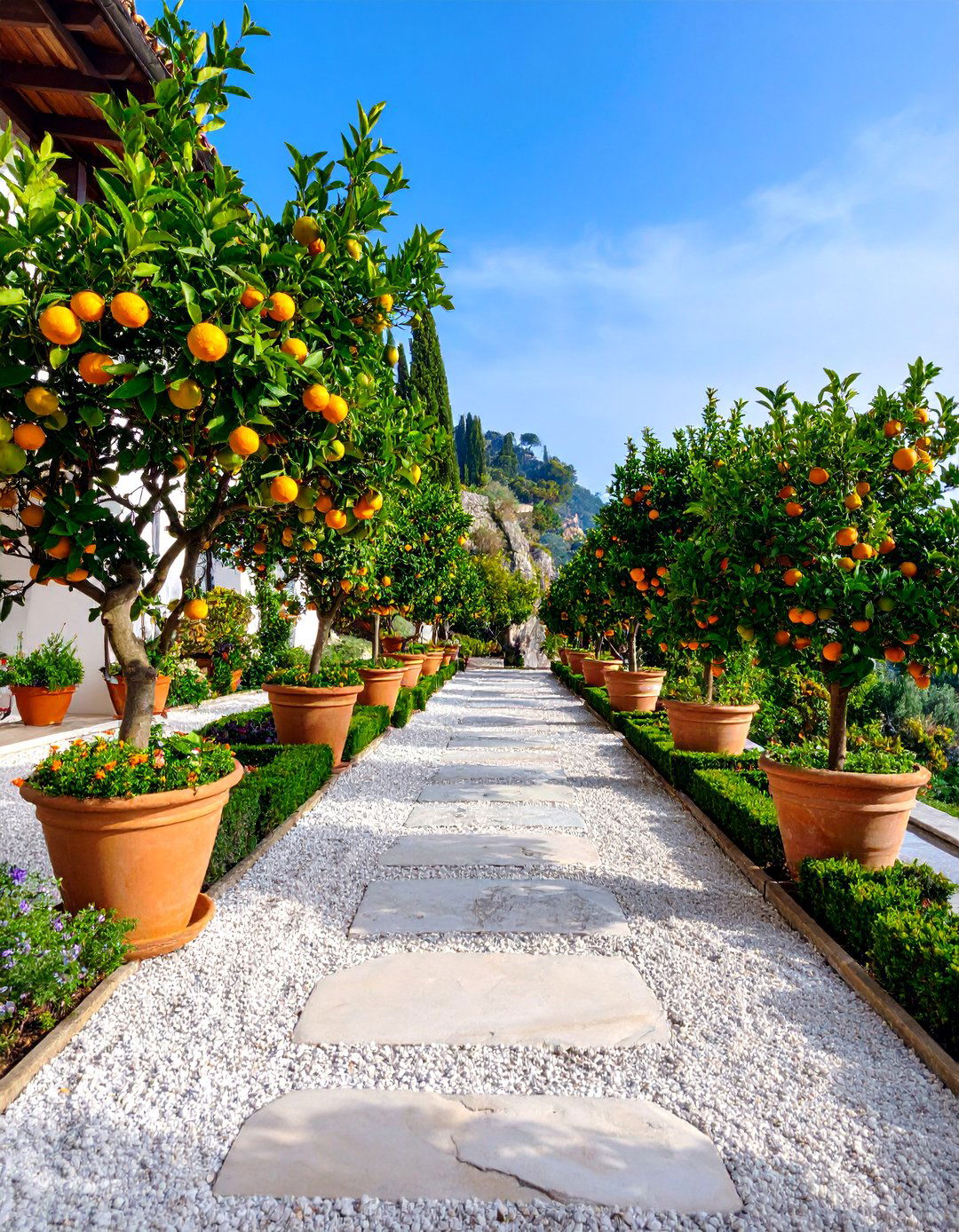
Celebrating Italy's abundant citrus culture, this garden design features moveable collections of lemon, orange, and lime trees in large decorative containers. During growing season, trees are arranged in geometric patterns across terraced levels or courtyard spaces, their glossy foliage and seasonal fruits creating both beauty and bounty. Winter storage areas or conservatories protect tender varieties, while hardy specimens remain outdoors year-round in milder climates. Underplantings of Mediterranean herbs and bulbs provide seasonal interest around tree bases, while gravel or stone surfaces allow for easy container movement and excellent drainage. Seating areas positioned to enjoy citrus fragrance during blooming periods enhance the sensory experience, making this design both practical and romantic for appropriate climate zones.
12. Topiary Garden with Sculptural Evergreens and Formal Pathways
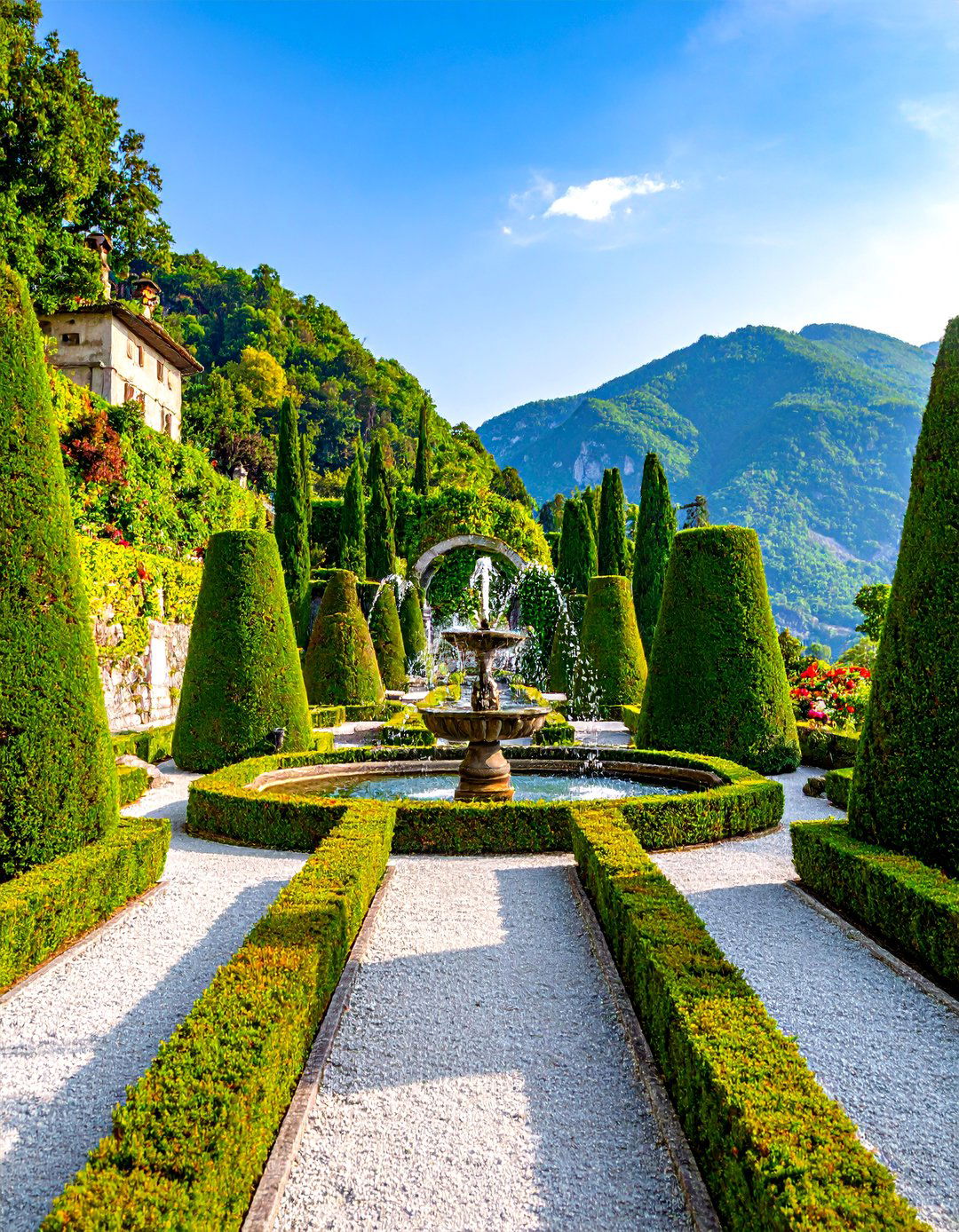
This specialized garden celebrates the Italian art of topiary through collections of carefully shaped evergreen specimens arranged in formal patterns. Boxwood, yew, and bay laurel trained into spheres, cones, spirals, and architectural forms create living sculptures that provide year-round interest and structure. Wide gravel or stone pathways allow for easy maintenance access and proper viewing angles of topiary artworks, while regular spacing creates rhythmic visual patterns. Central focal points might include elaborate topiary specimens or classical fountains surrounded by simpler geometric forms. Regular maintenance schedules keep plants in perfect condition, making this garden type ideal for those who enjoy precision gardening and have time for frequent pruning and shaping activities.
13. Romantic Garden with Climbing Roses and Arbor Structures
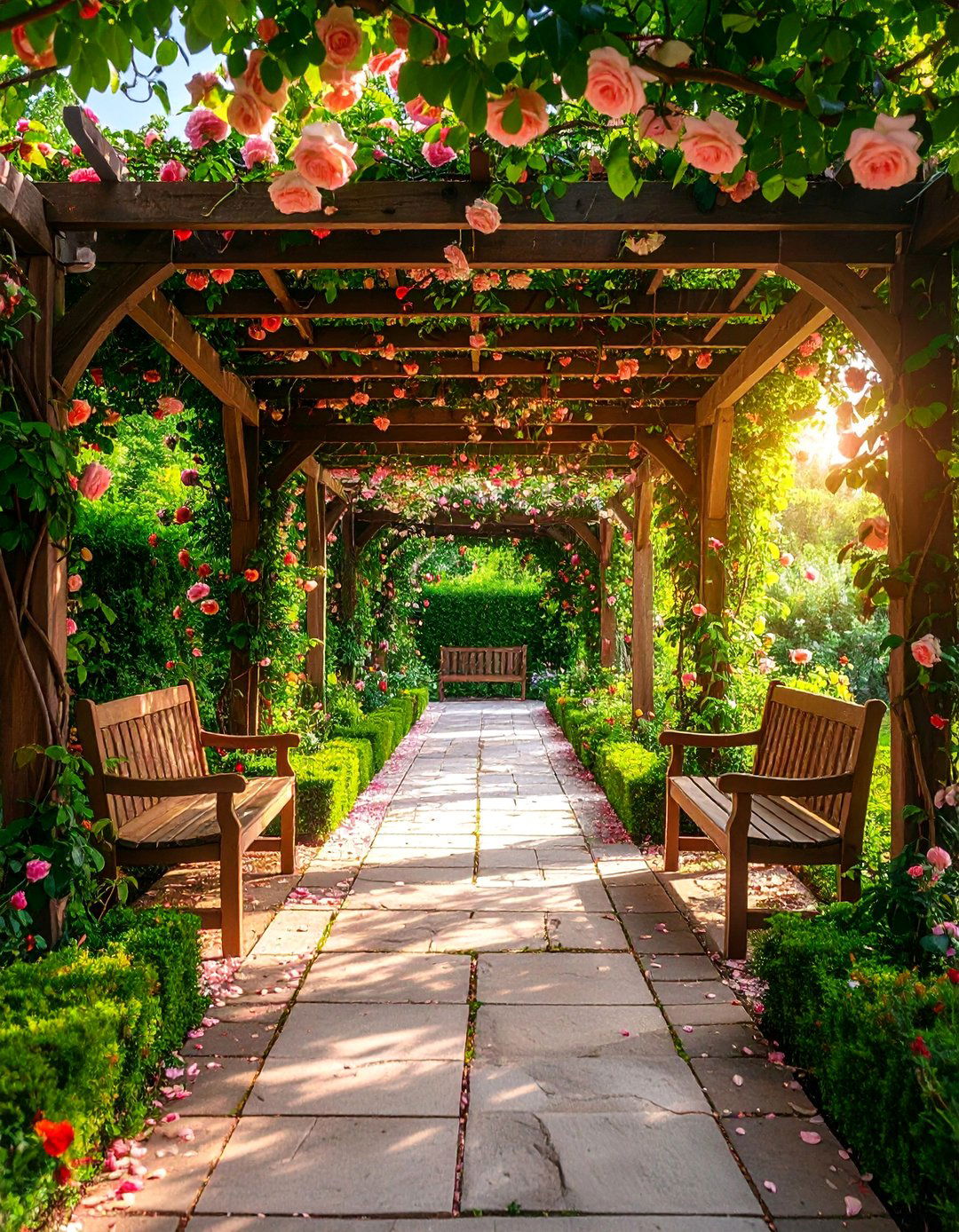
Romance defines this garden style through abundant flowering vines, intimate seating areas, and soft evening lighting. Rose-covered arbors create fragrant tunnels and doorways between garden rooms, while pergolas support vigorous climbing varieties that provide seasonal ceiling decorations. Stone or brick pathways wind through planted borders featuring companion plants like lavender, catmint, and silver artemisia that complement rose colors and extend blooming seasons. Comfortable benches positioned in semi-private alcoves encourage quiet conversation, enhanced by the gentle sound of small fountains or wind chimes. Evening lighting from lanterns or string lights extends garden enjoyment into nighttime hours, creating magical atmospheres perfect for outdoor entertaining or private relaxation in these romantically designed spaces.
14. Grotto Garden with Natural Stone and Fern Collections
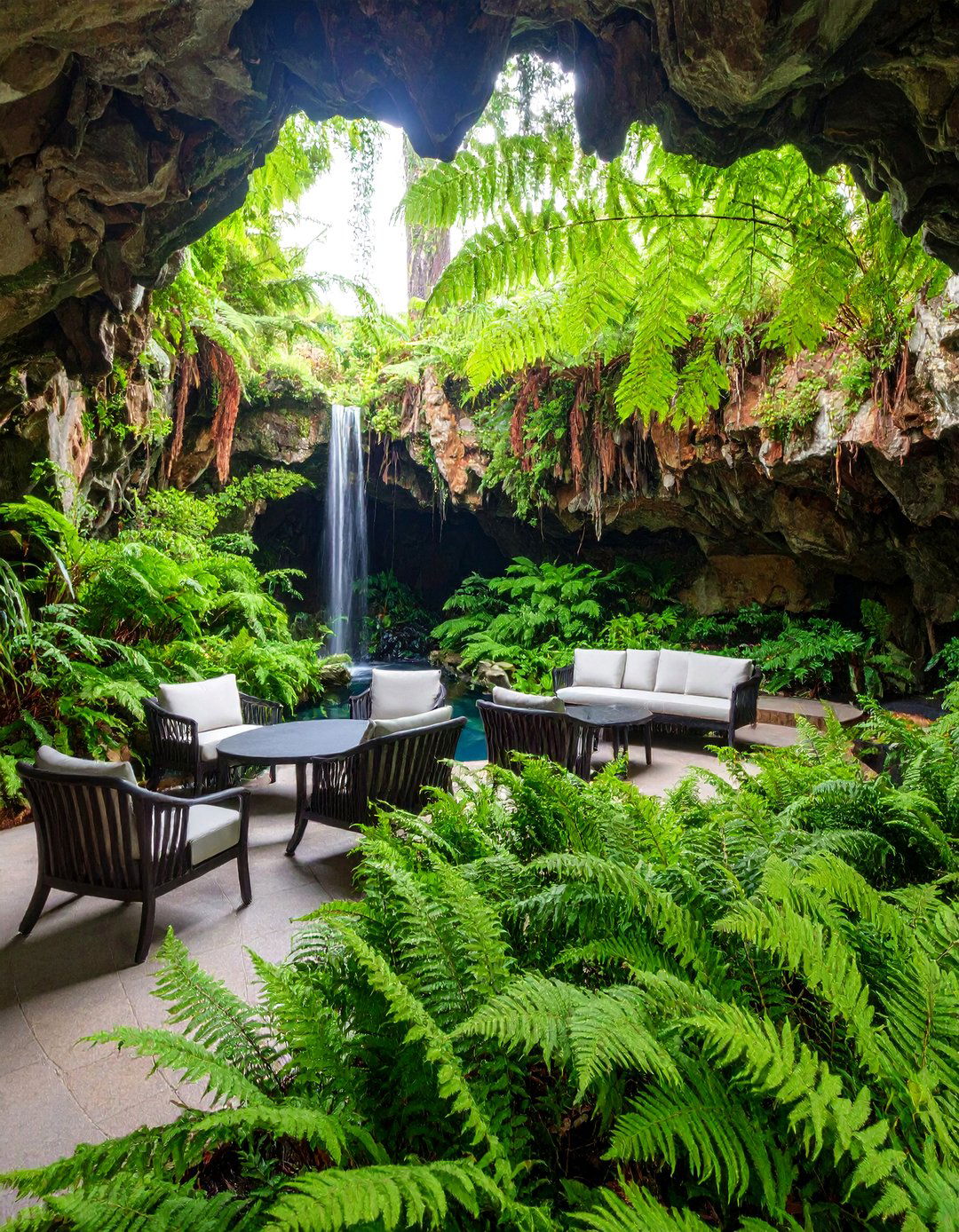
Drawing inspiration from Renaissance grotto traditions, this garden creates cool retreats using natural rock outcroppings or constructed stone formations. Carved stone faces, shells, and mineral specimens decorate grotto interiors, often incorporating small water features that provide gentle background sounds and increased humidity for plant growth. Fern collections thrive in the protected environment, joined by other shade-loving plants like hostas, begonias, and moss that create lush green tapestries. Seating areas within or adjacent to grottos offer respite from garden heat while providing unique perspectives on garden design. This specialized feature works particularly well in areas with natural stone outcroppings or where constructed as focal points within larger garden schemes.
15. Kitchen Garden with Raised Beds and Productive Planting
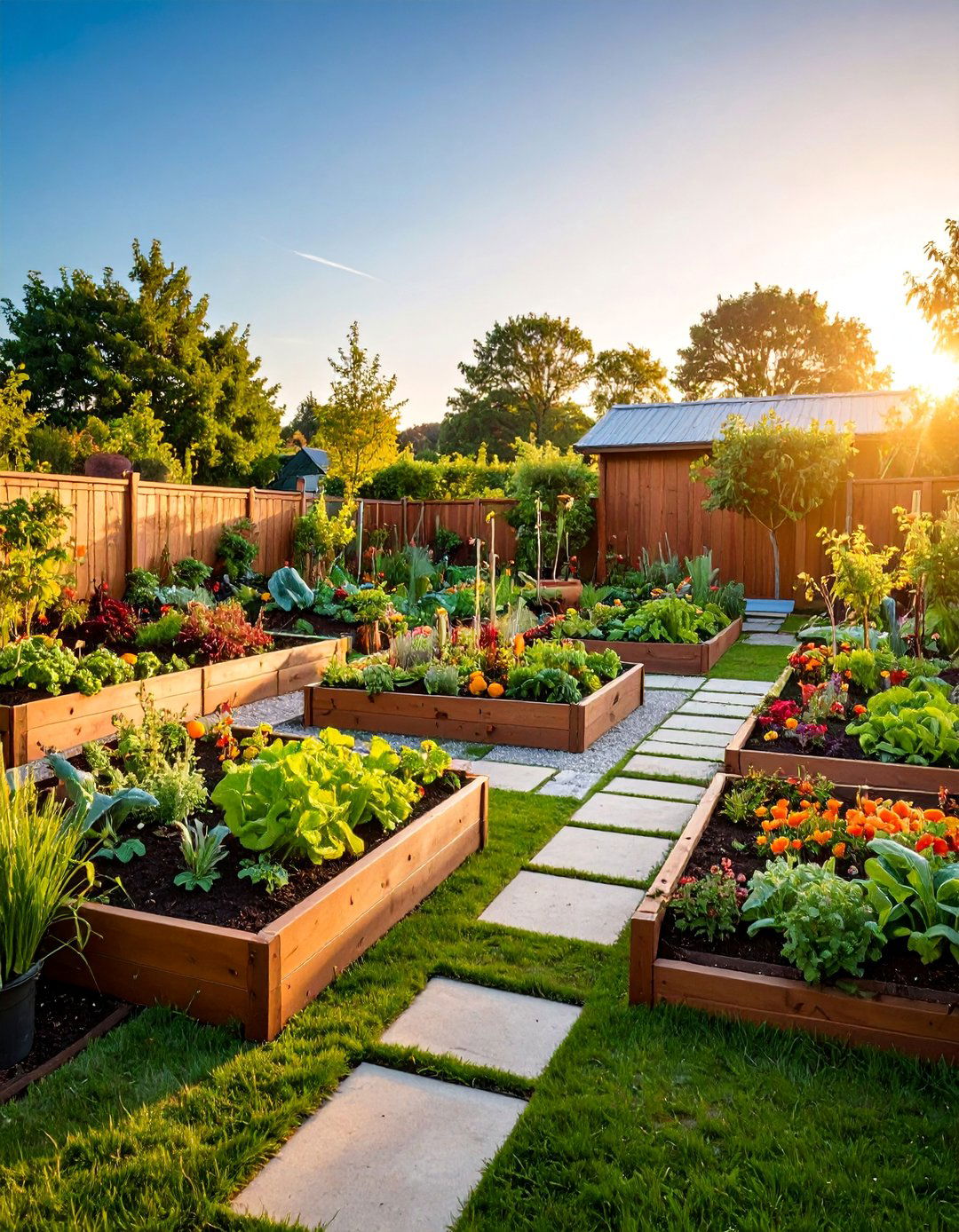
Combining beauty with productivity, this Italian-inspired kitchen garden supplies fresh vegetables, herbs, and fruits through organized raised bed systems. Stone or wooden raised beds create geometric patterns while improving drainage and soil management for intensive cultivation. Central pathways provide access to all planting areas, often featuring decorative paving or gravel that complements surrounding hardscape elements. Fruit trees trained along walls or grown in containers provide vertical growing space and seasonal interest, while herb borders supply culinary necessities close to outdoor cooking areas. Compost areas and tool storage integrate seamlessly into overall design schemes, making this garden both beautiful and highly functional for serious home food production.
16. Statue Garden with Classical Sculptures and Evergreen Backdrops
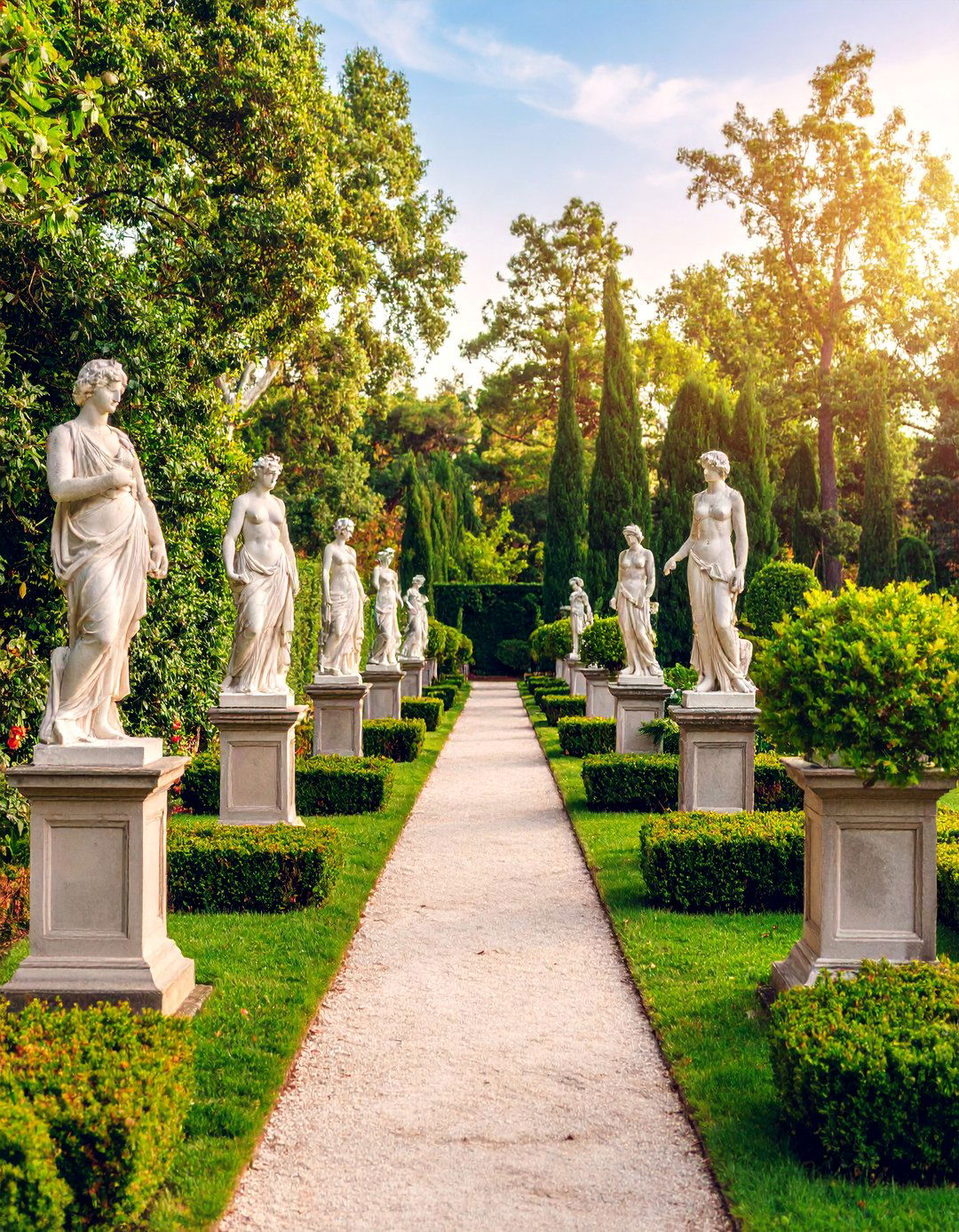
Classical statuary takes center stage in this garden design that celebrates Italian artistic heritage through carefully positioned sculptural elements. Marble or stone figures representing mythological characters, historical figures, or abstract forms serve as focal points within evergreen planting schemes that provide year-round backdrop interest. Pedestals and plinths elevate sculptures for proper viewing while protecting them from ground moisture and damage. Surrounding plantings of bay laurel, boxwood, and other traditional Italian garden plants create appropriate settings without overwhelming artistic elements. Pathways direct visitors toward optimal viewing positions, while strategic lighting allows for evening appreciation of sculptural details. This garden type works best with authentic or high-quality reproduction pieces that can withstand outdoor weather conditions.
17. Vineyard Garden with Grape Arbors and Wine Country Atmosphere

Inspired by Italian wine regions, this garden design incorporates grape growing into ornamental landscape schemes through decorative arbor systems and productive plantings. Wooden or metal arbor structures support vigorous grape vines that provide seasonal canopies over pathways and seating areas, offering spring flowers, summer shade, autumn color, and winter architectural interest. Ground-level plantings feature Mediterranean herbs and perennials that complement vineyard aesthetics while requiring similar growing conditions. Stone or gravel pathways echo traditional vineyard roads, leading to outdoor dining areas where homegrown grapes can be enjoyed. This design works particularly well in areas with appropriate climate conditions for grape cultivation, creating authentic wine country atmosphere in residential settings.
18. Parterre Garden with Intricate Patterns and Seasonal Color
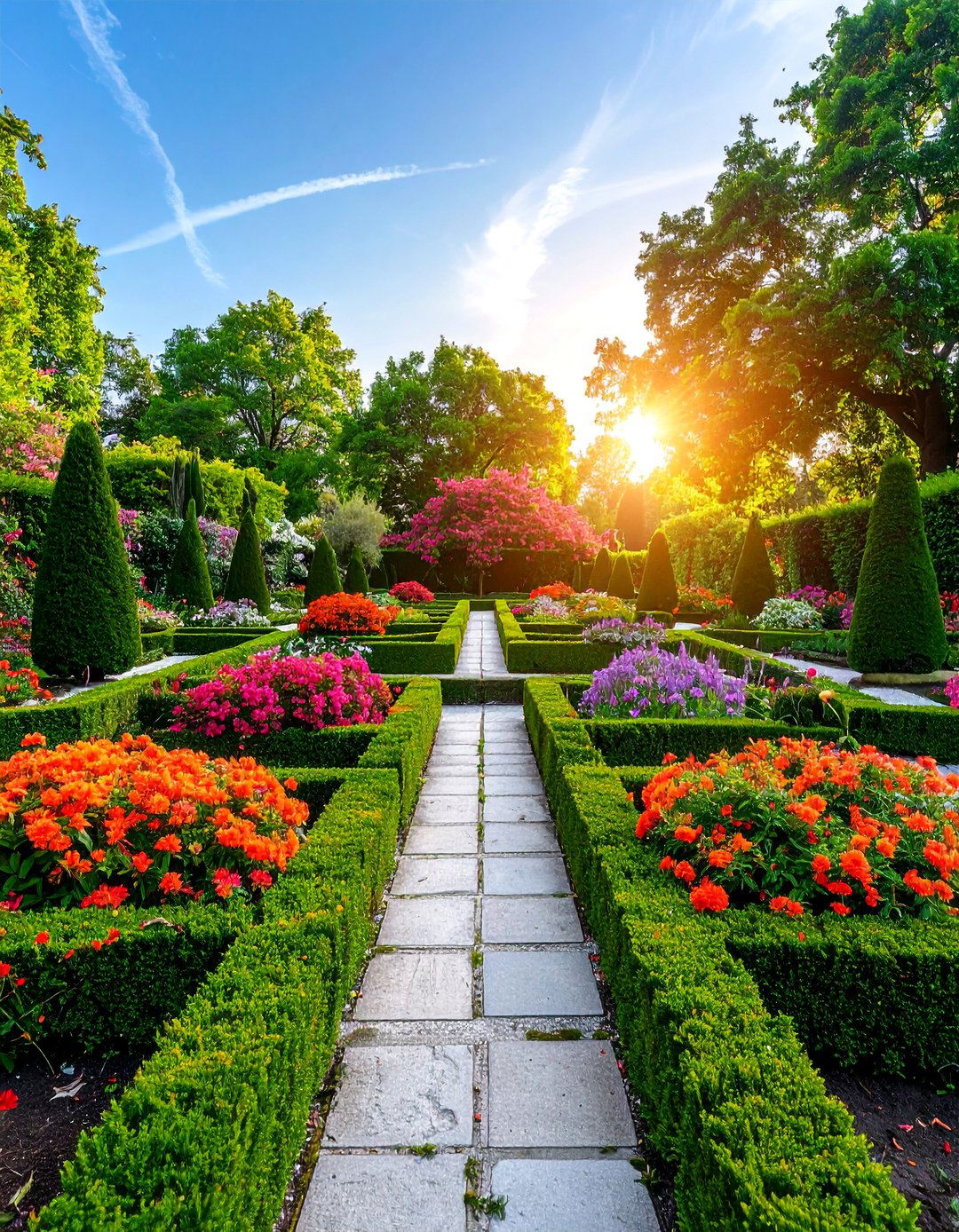
Following classical French-Italian parterre traditions, this formal garden design creates elaborate patterns using precisely maintained plant materials and seasonal color schemes. Low hedging of boxwood or alternative evergreens outlines intricate geometric patterns filled with colorful annuals, bulbs, or decorative gravels that change throughout growing seasons. Central axis lines and symmetrical arrangements create formal compositions best viewed from elevated positions like second-story windows or raised terraces. Maintenance requirements are intensive but rewarding, as perfectly executed parterres provide unmatched elegance and sophistication. Corner accents of topiary specimens or ornamental urns punctuate pattern intersections, while surrounding lawn areas or gravel surfaces provide visual rest spaces that emphasize parterre complexity.
19. Mediterranean Patio with Outdoor Living and Entertainment Spaces

This design transforms patios into complete outdoor living environments through Italian-inspired furniture, plantings, and architectural elements. Stone or tile surfaces provide durable foundations for dining tables, lounge seating, and cooking areas that encourage extended outdoor use throughout favorable weather periods. Large terracotta planters filled with olive trees, citrus, or seasonal flowers define seating zones while maintaining flexibility for furniture rearrangement. Pergola structures or market umbrellas provide essential shade, often supporting climbing vines that add vertical interest and seasonal change. Outdoor kitchens, pizza ovens, or simple grilling areas extend culinary activities into garden settings, while lighting systems allow for evening entertainment and dining under stars.
20. Lavender Garden with Fragrant Pathways and Purple Blooms
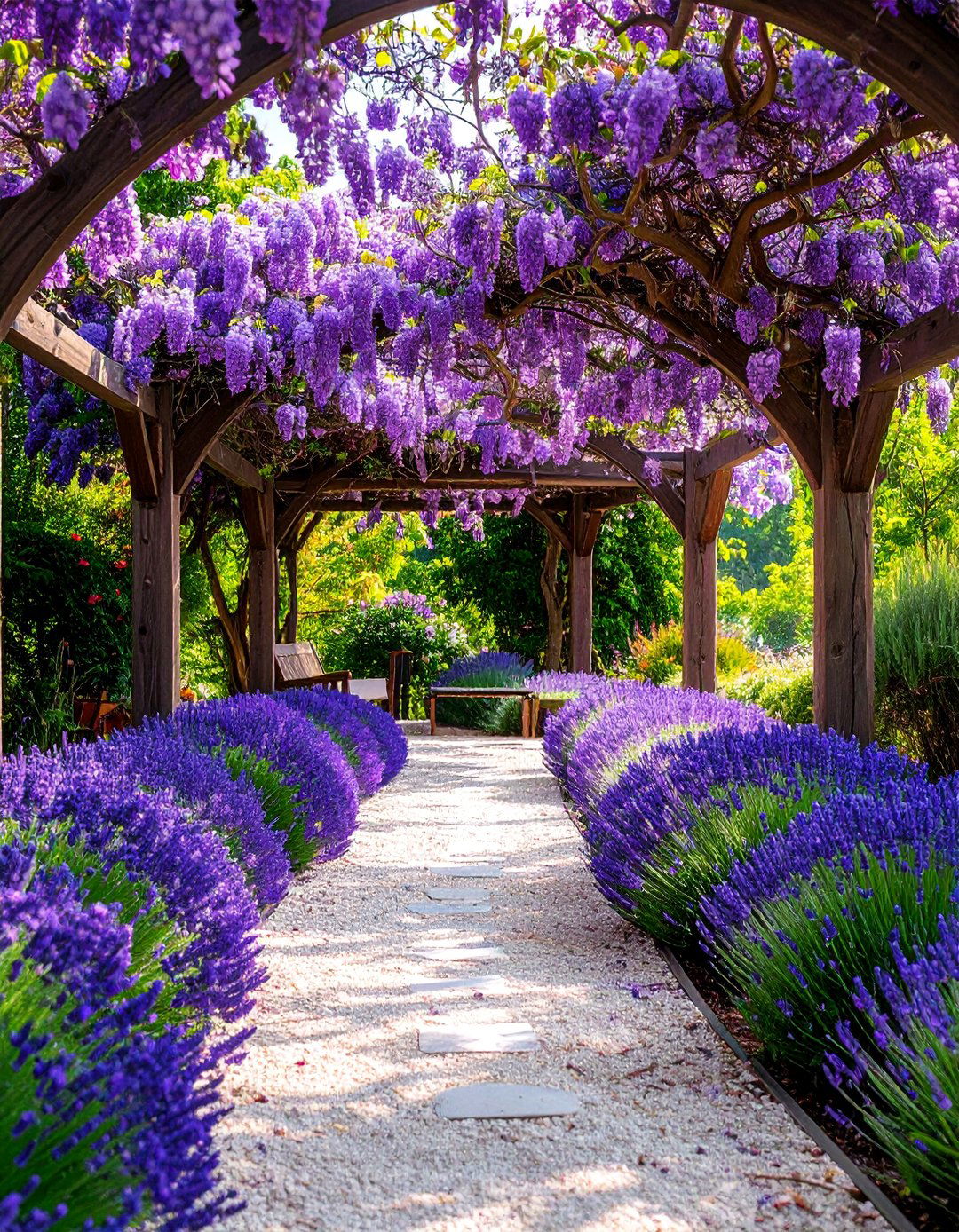
Celebrating one of Italy's most beloved plants, this specialized garden showcases lavender varieties through mass plantings, pathway borders, and decorative arrangements. Different lavender species and cultivars provide extended blooming seasons and varied purple, blue, and white flower colors, while maintaining consistent silver-green foliage throughout growing periods. Gravel or stone pathways wind through lavender fields, releasing fragrance with every footstep and creating sensory garden experiences. Harvesting and drying areas allow for practical use of lavender crops, while seating areas positioned within plantings maximize fragrance appreciation. Companion plants like rosemary, sage, and other Mediterranean herbs extend color seasons and provide varied textures that complement lavender's distinctive appearance and growth habits.
21. Courtyard Garden with Enclosed Privacy and Intimate Scale
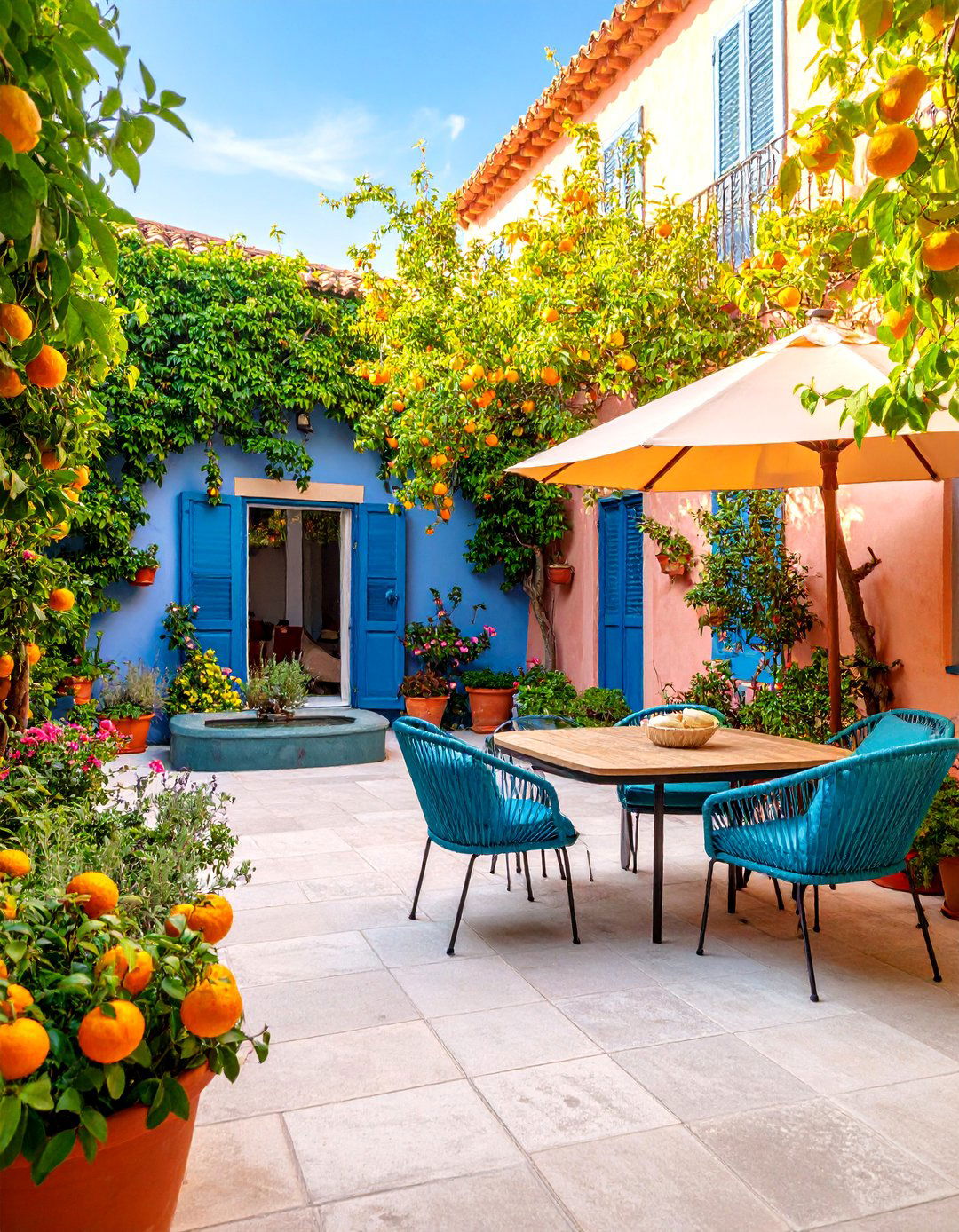
Perfect for urban settings, this enclosed courtyard design maximizes limited space through vertical growing, container plantings, and multi-functional elements. High walls support climbing vines that provide privacy screening while adding vertical garden interest through flowering and foliage displays. Container gardens allow for seasonal changes and easy maintenance, featuring Italian favorites like herbs, citrus trees, and flowering annuals in decorative terracotta or glazed ceramic pots. Central water features provide cooling effects and pleasant sounds in confined spaces, while comfortable seating areas make courtyard useful for relaxation and entertainment. Overhead structures like pergolas or awnings provide essential shade while supporting additional climbing plants that create intimate outdoor room feelings.
22. Terraced Hillside Garden with Stone Walls and Level Plantings

Transforming sloped terrain into usable garden space, this design creates multiple planting and activity levels connected by stone staircases and pathways. Each terrace serves different functions, from herb growing and vegetable production to seating areas and ornamental displays, maximizing landscape utility while creating visual interest through elevation changes. Stone retaining walls provide structural support while offering opportunities for trailing plant displays and integrated seating elements. Drainage systems within walls prevent erosion while supporting healthy plant growth across all levels. Mediterranean plants that thrive in well-drained conditions populate terraced beds, while trees positioned at strategic locations provide shade and visual anchors that unify the overall composition.
23. Olive Grove Garden with Ancient Trees and Mediterranean Understory

Centering around mature olive trees, this garden design celebrates one of Italy's most iconic plants through naturalistic growing patterns and Mediterranean companion plantings. Existing mature trees or newly planted specimens create overhead canopy while allowing filtered light to reach understory plantings of lavender, rosemary, wild thyme, and other drought-tolerant perennials. Informal pathways wind between trees, often surfaced with decomposed granite or natural stone that complements olive bark colors and Mediterranean aesthetics. Seasonal bulbs provide spring color beneath trees, while herbs can be harvested for culinary use throughout growing seasons. This design works particularly well in climates similar to Mediterranean regions, creating authentic Italian garden atmosphere through appropriate plant selection and naturalistic arrangement patterns.
24. Renaissance Water Theater with Cascades and Architectural Features
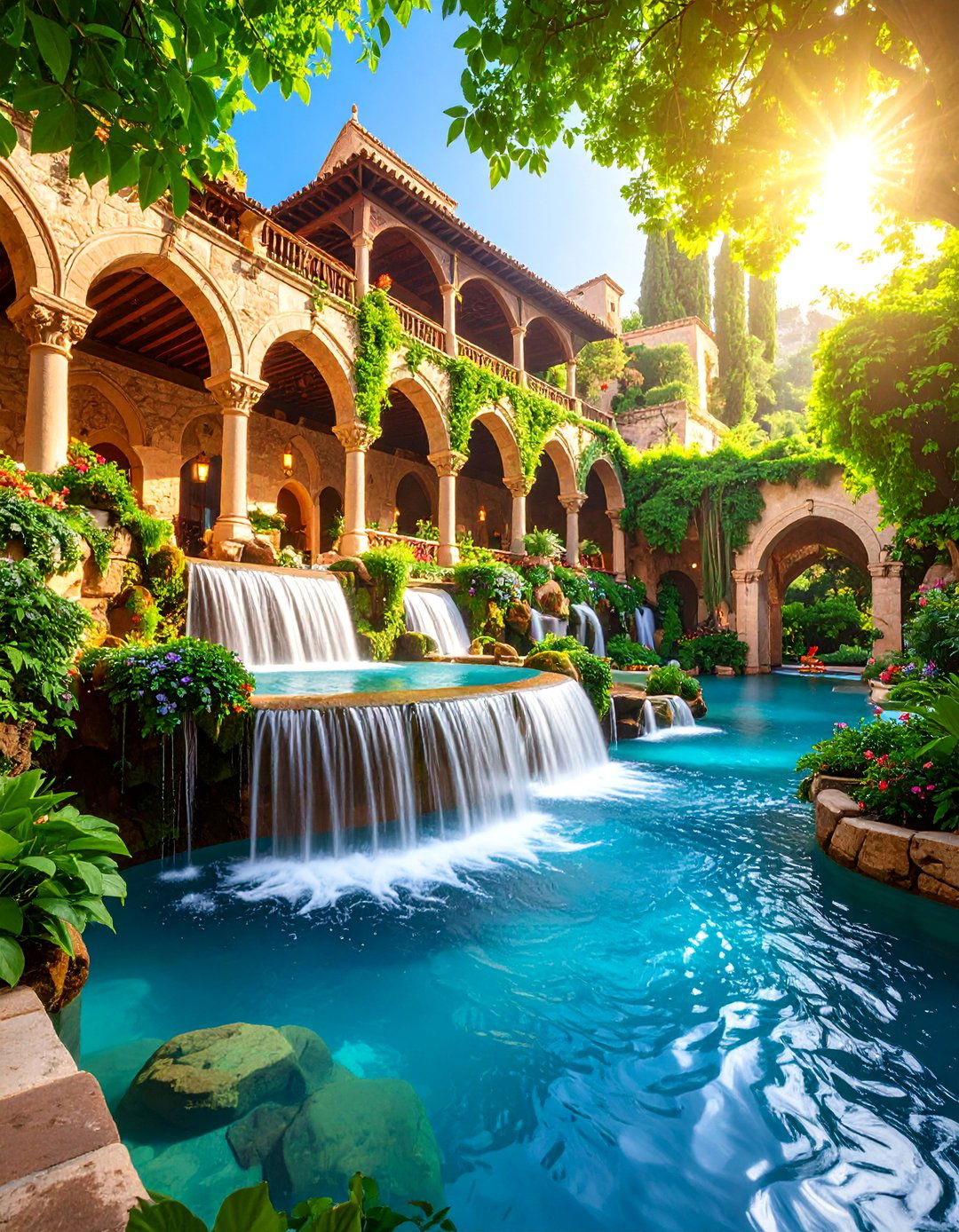
Inspired by grand Italian villa water gardens, this elaborate design showcases water in motion through terraced cascades, fountains, and architectural water features. Stone channels direct water flow between levels, creating both visual drama and cooling sound effects throughout garden spaces. Classical architectural elements like columns, arches, and decorative basins provide structural framework while supporting various water displays from gentle trickles to dramatic jets. Surrounding plantings emphasize evergreen structure that remains attractive year-round while complementing stone architectural elements. This garden type requires significant water sources and pump systems but creates unmatched elegance and sophistication appropriate for formal landscape settings where water features serve as primary garden focal points.
25. Contemporary Italian Garden with Minimalist Design and Bold Plants
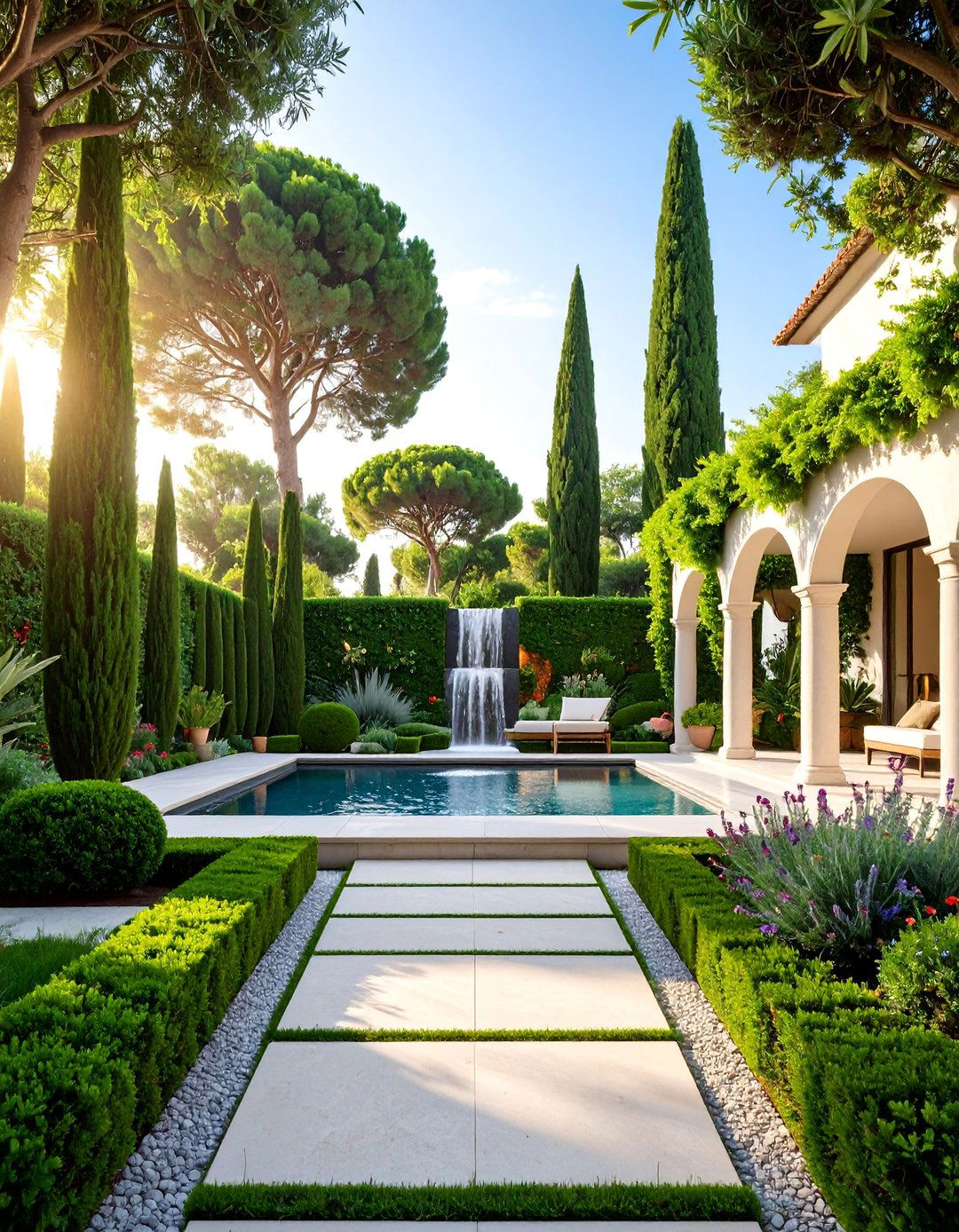
Modern interpretation of Italian garden principles emphasizes simplified plant palettes, clean geometric lines, and contemporary materials while maintaining classical proportions and spatial relationships. Architectural plants like Italian cypress, olive trees, and ornamental grasses provide structure and seasonal interest without requiring complex maintenance schedules. Water features utilize contemporary materials and simplified forms while maintaining classical placement and proportion principles derived from Renaissance garden traditions. Outdoor furniture and hardscape elements feature modern materials like weathering steel, concrete, and composite decking that provide durability while complementing Mediterranean plant selections. Lighting systems highlight key plants and architectural features for evening garden enjoyment, creating spaces that feel both contemporary and timelessly Italian.
Conclusion:
Italian garden design offers timeless inspiration through its masterful blend of architectural structure, Mediterranean plantings, and outdoor living philosophy. These twenty-five design ideas demonstrate how classical principles can be adapted to various scales and settings, from intimate urban courtyards to expansive hillside estates. Whether drawn to formal Renaissance symmetry or rustic Tuscan charm, each approach celebrates the Italian tradition of creating beautiful, functional outdoor spaces that enhance daily life and provide peaceful retreat from modern pressures.




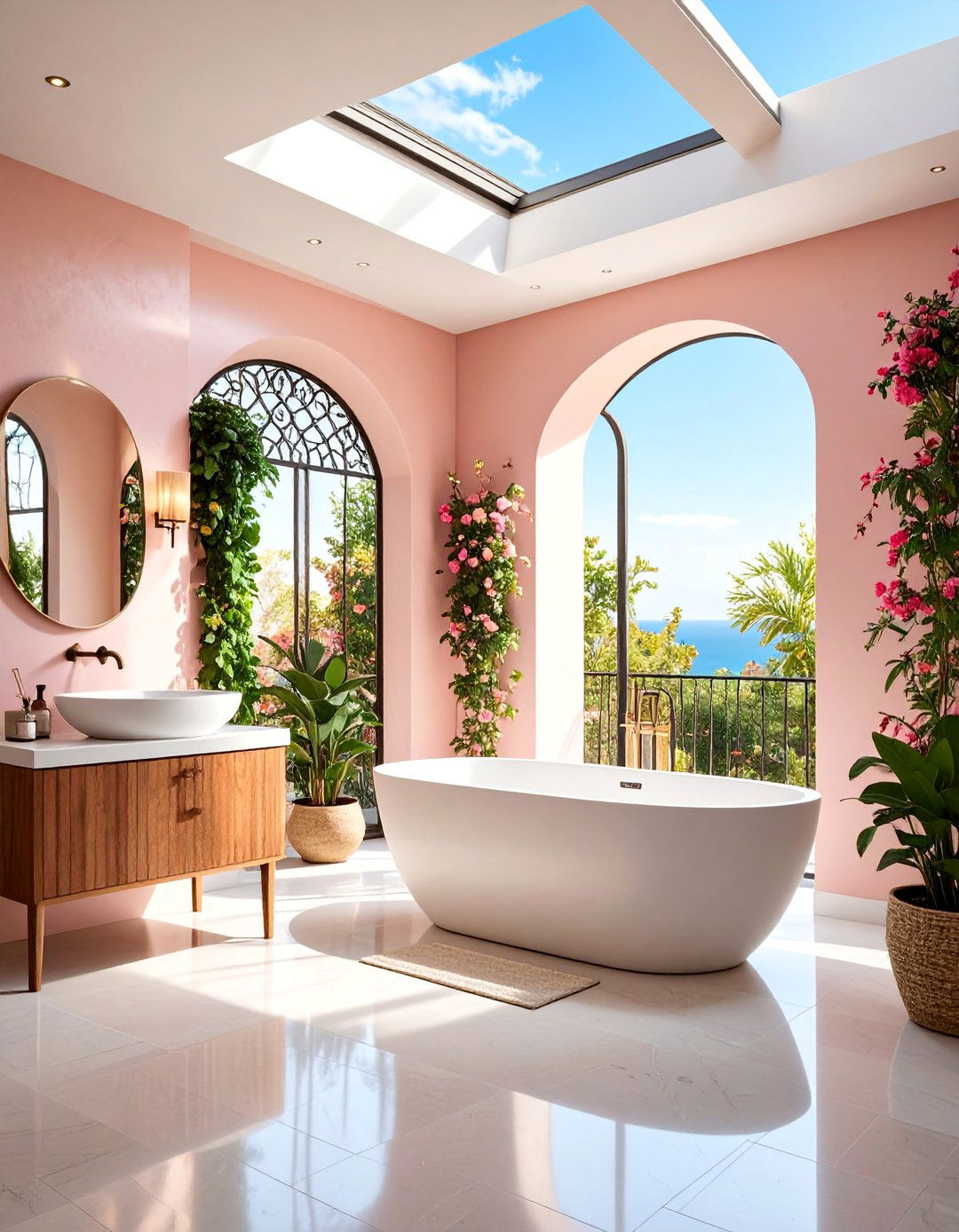

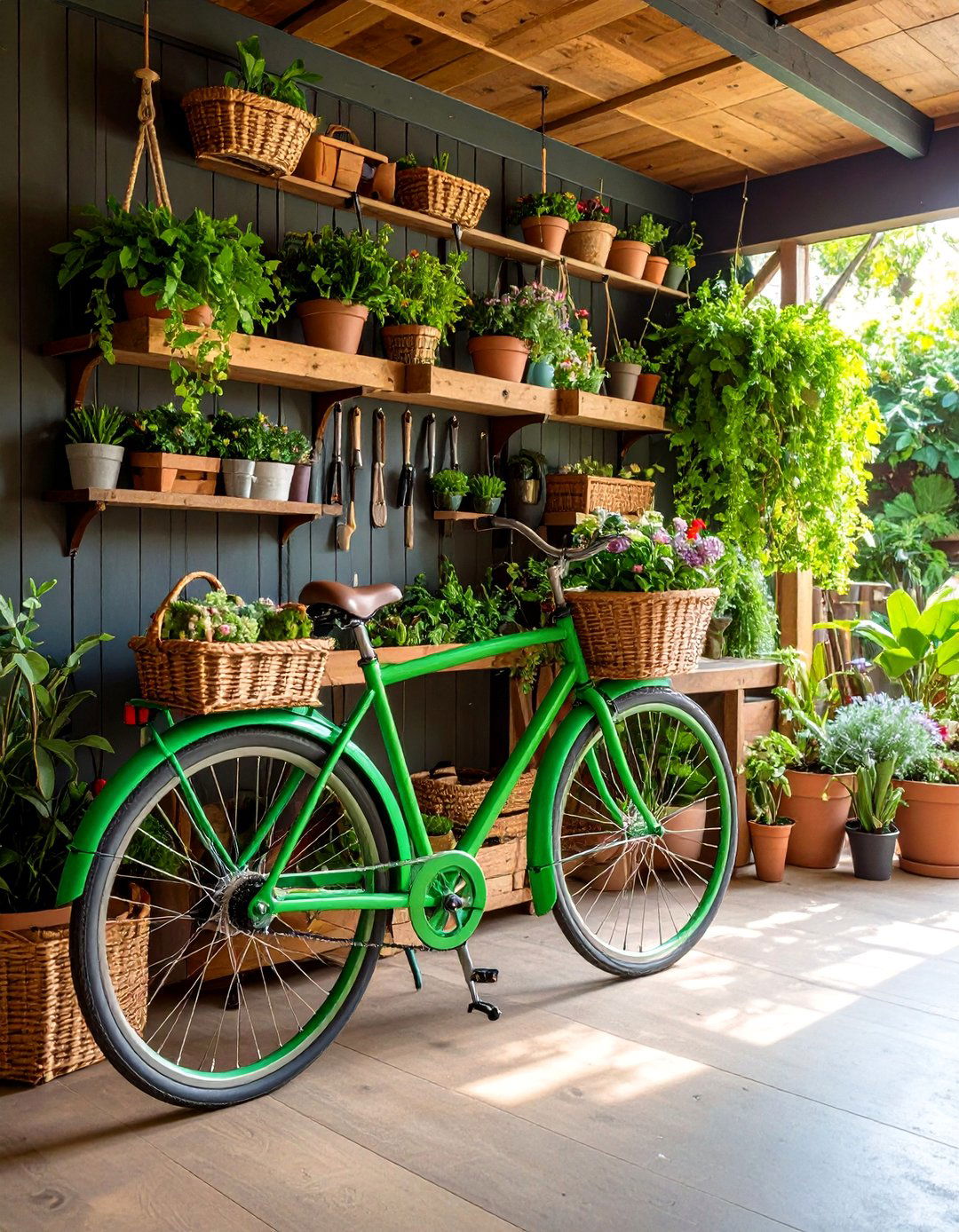
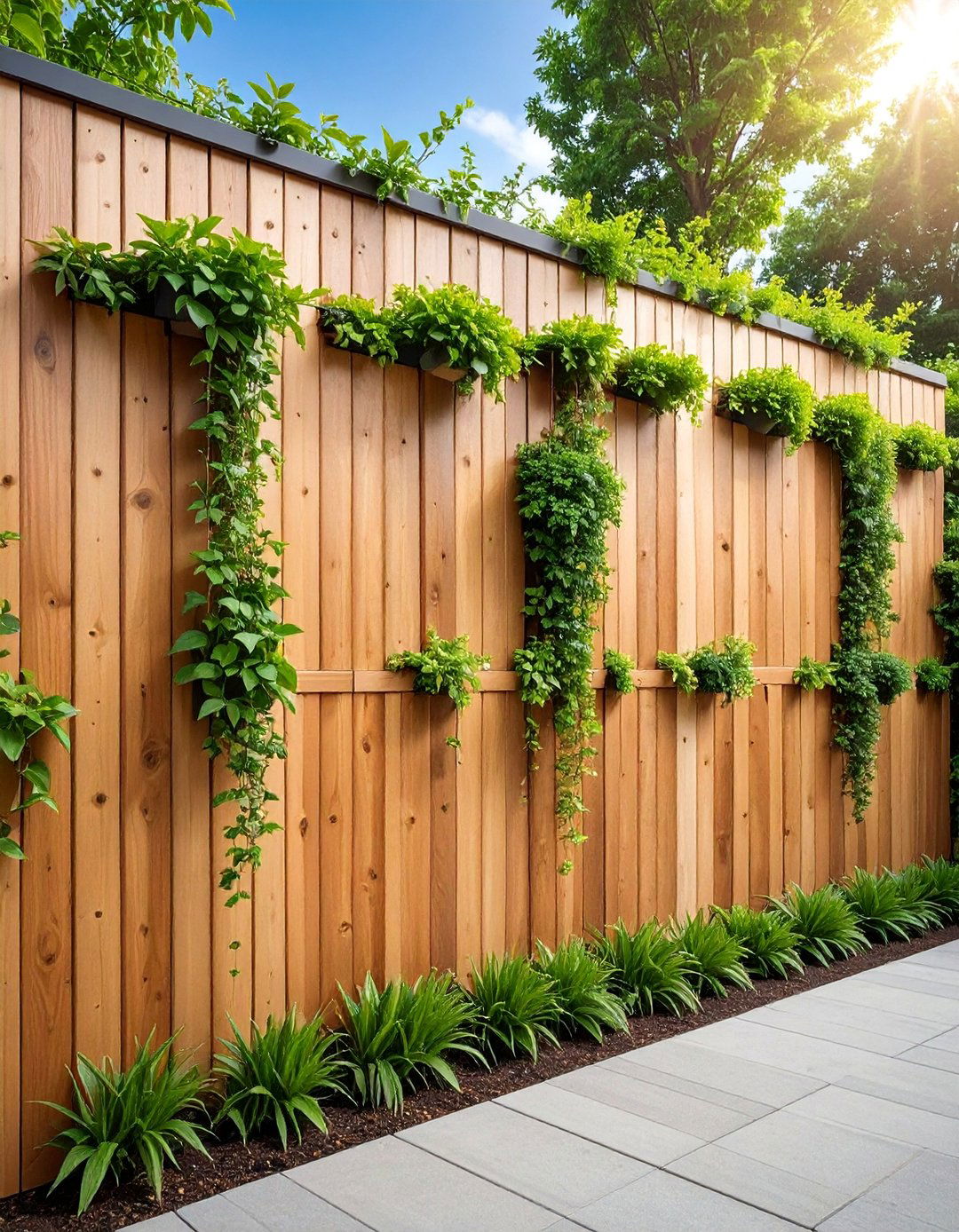
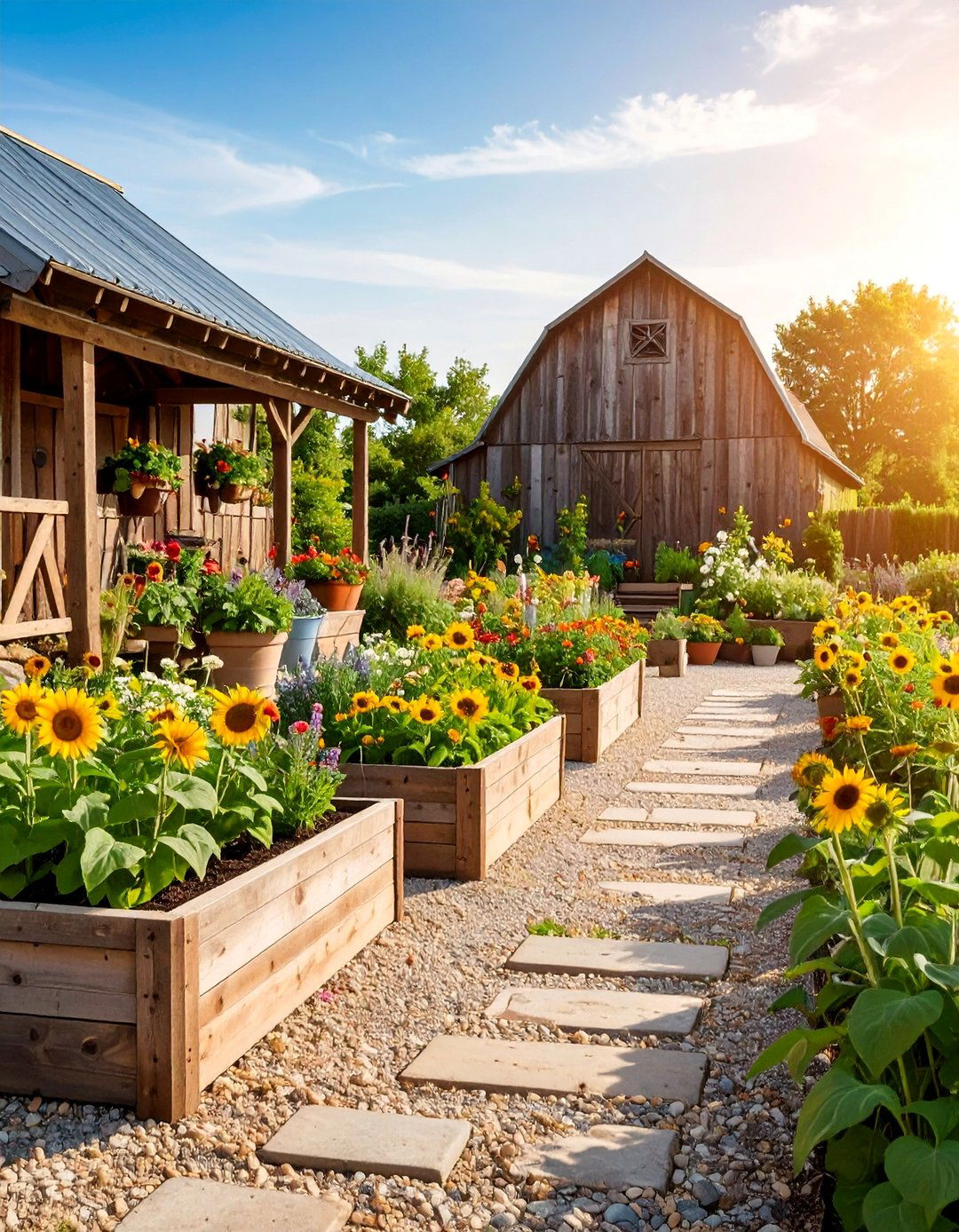
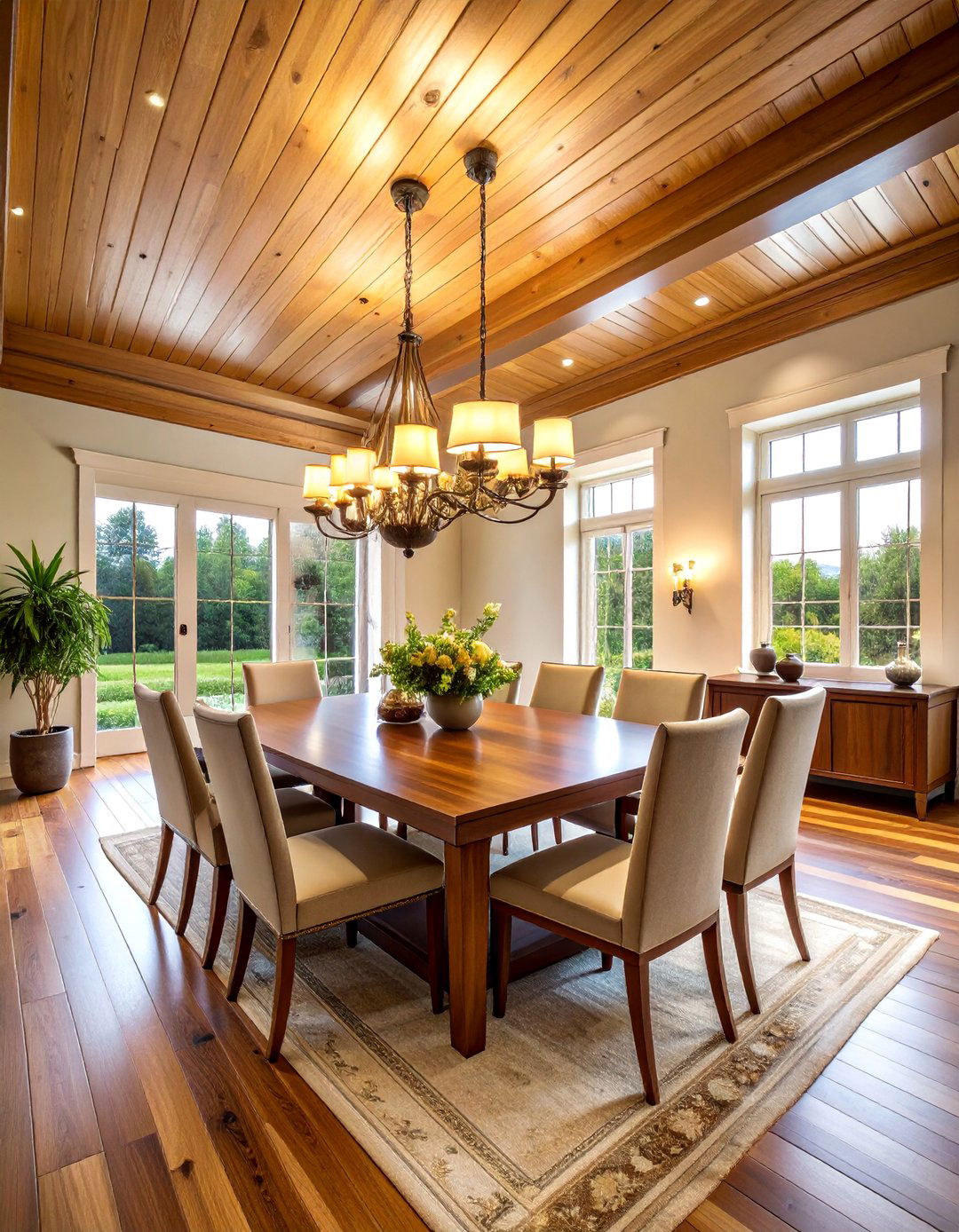
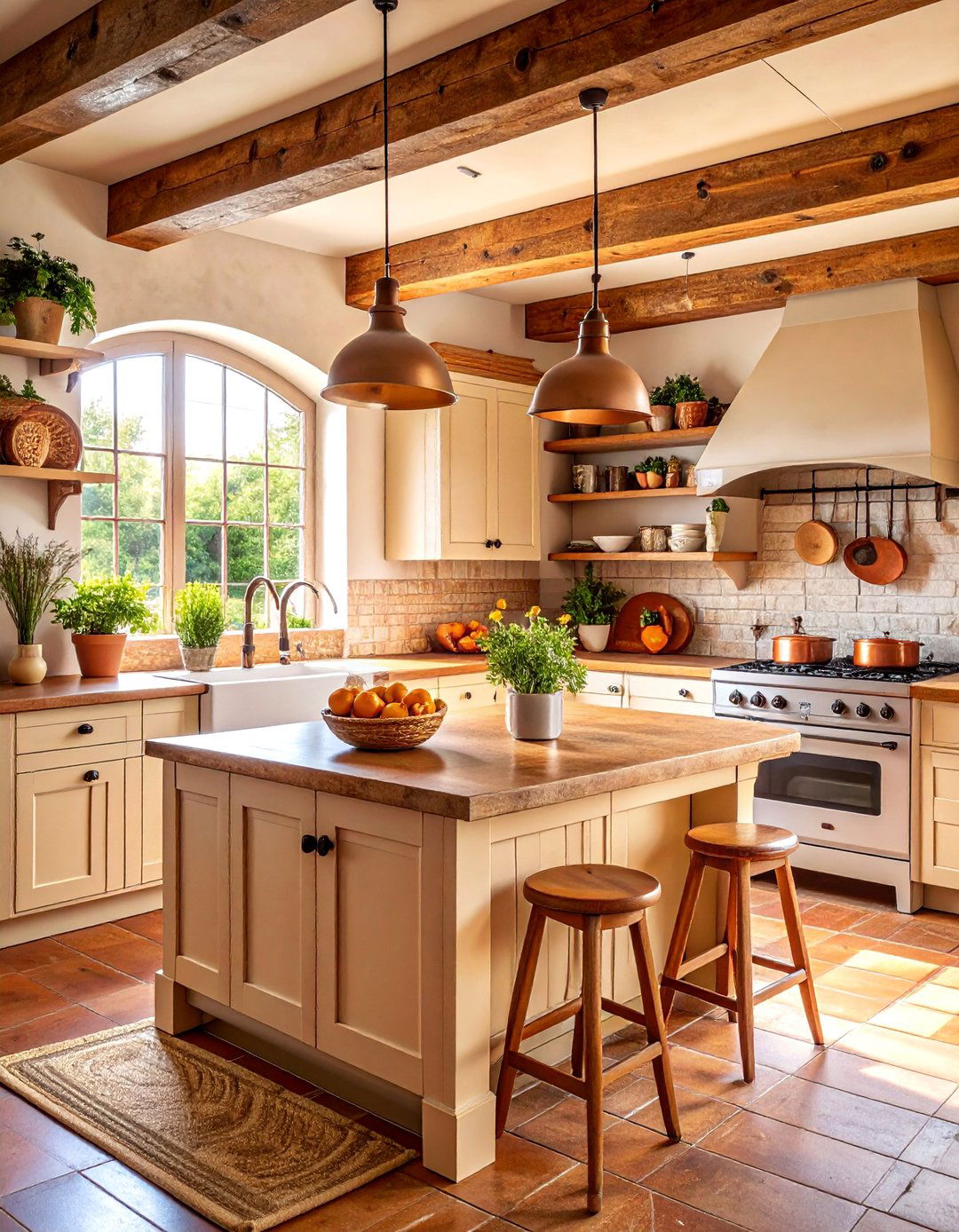
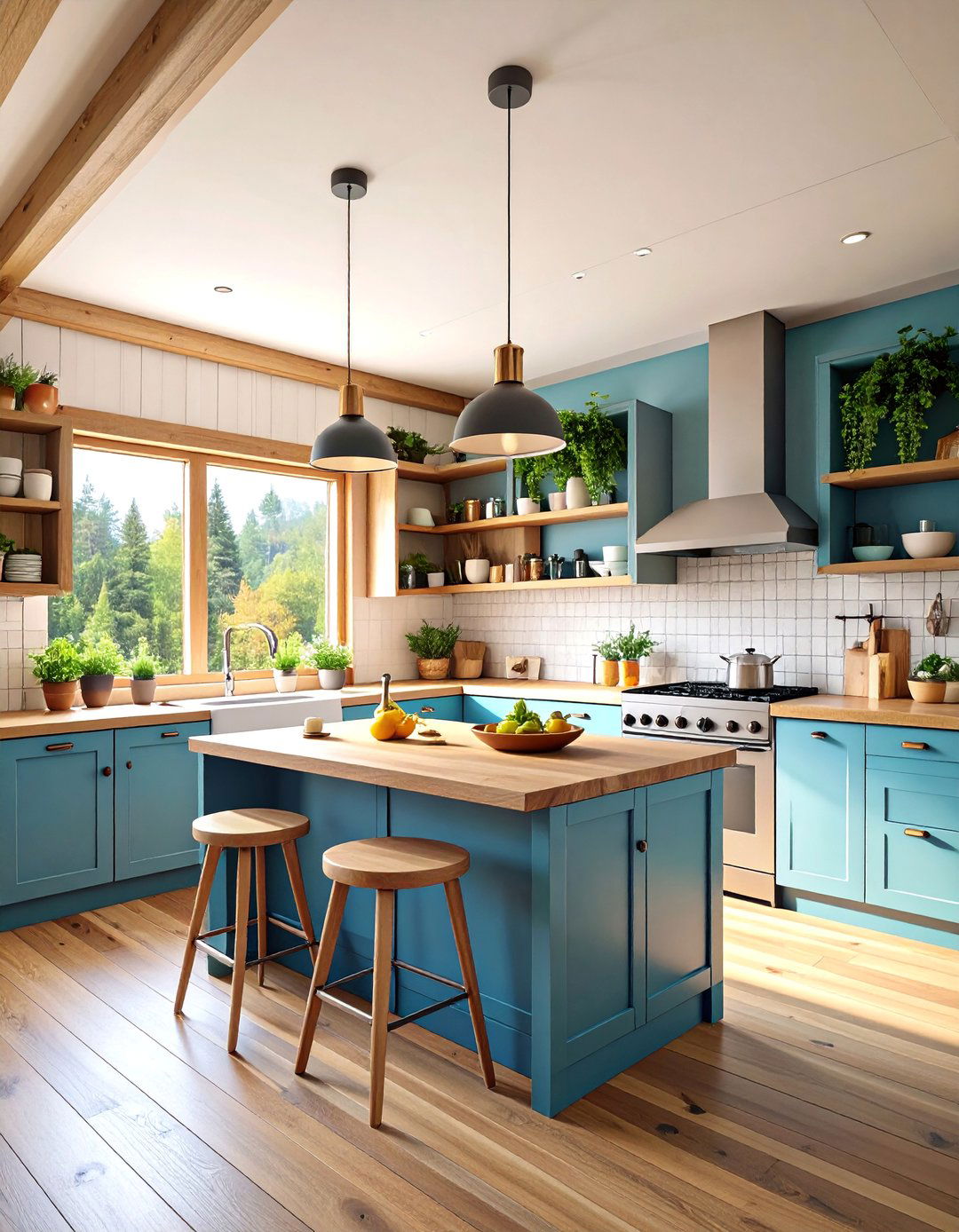

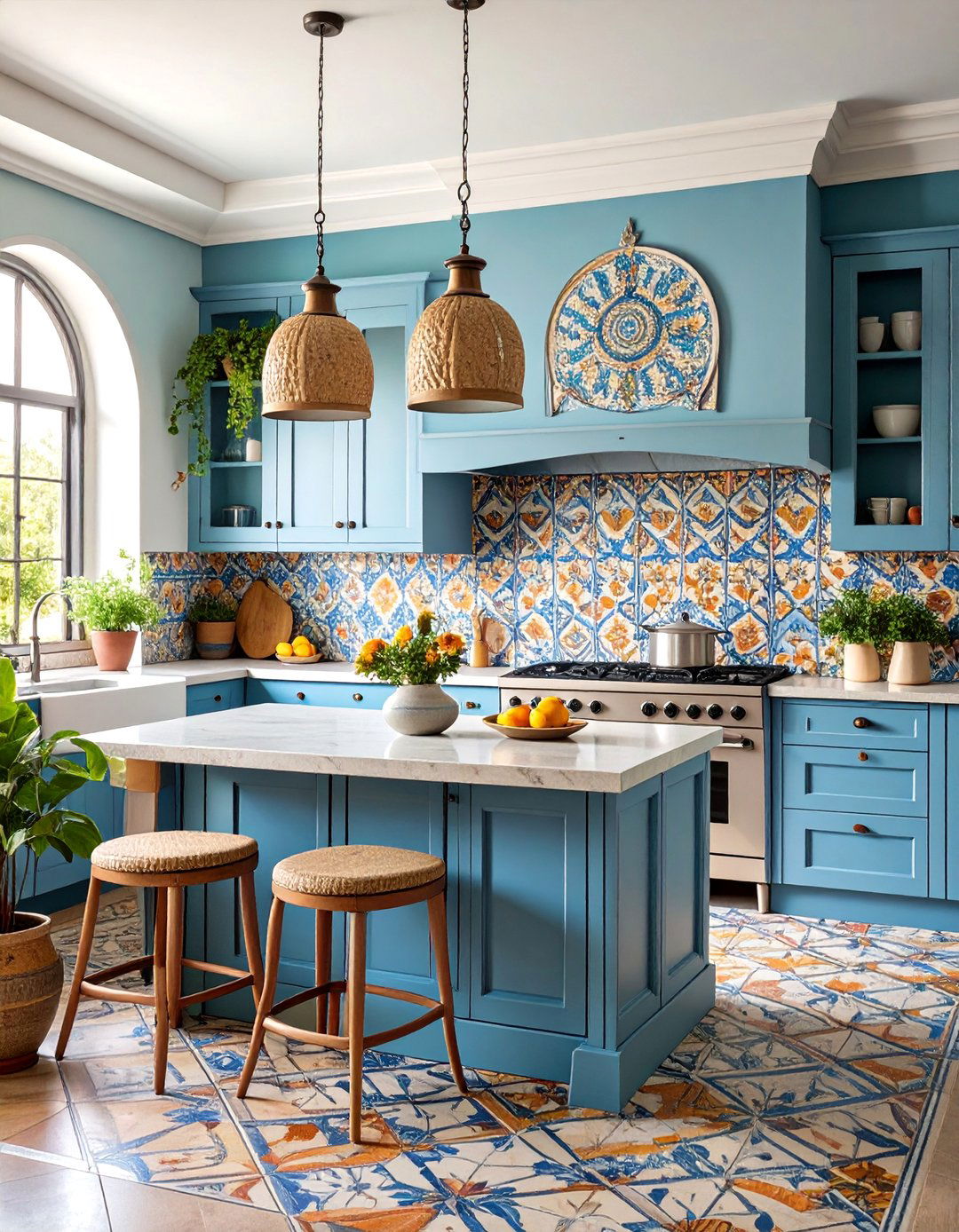
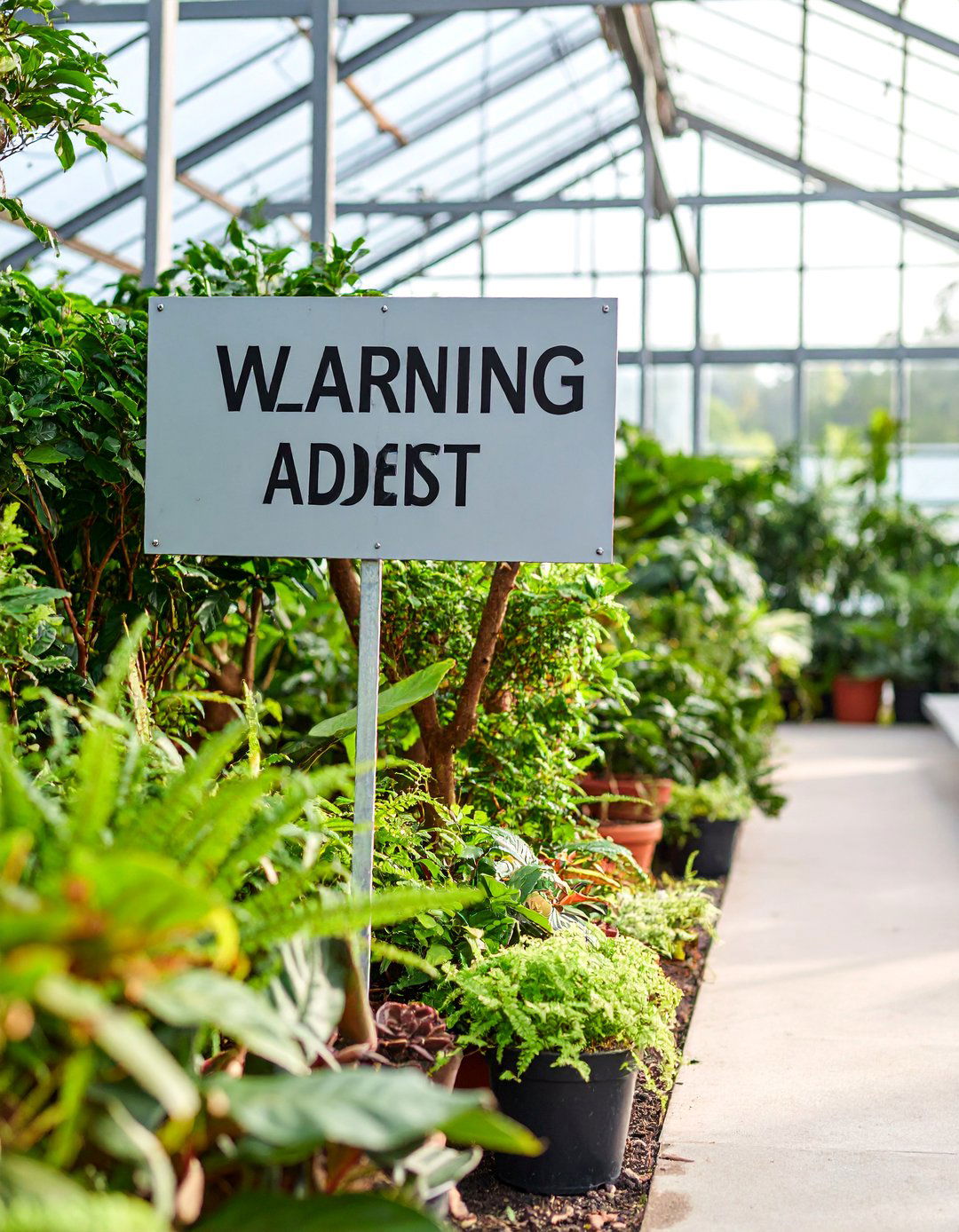
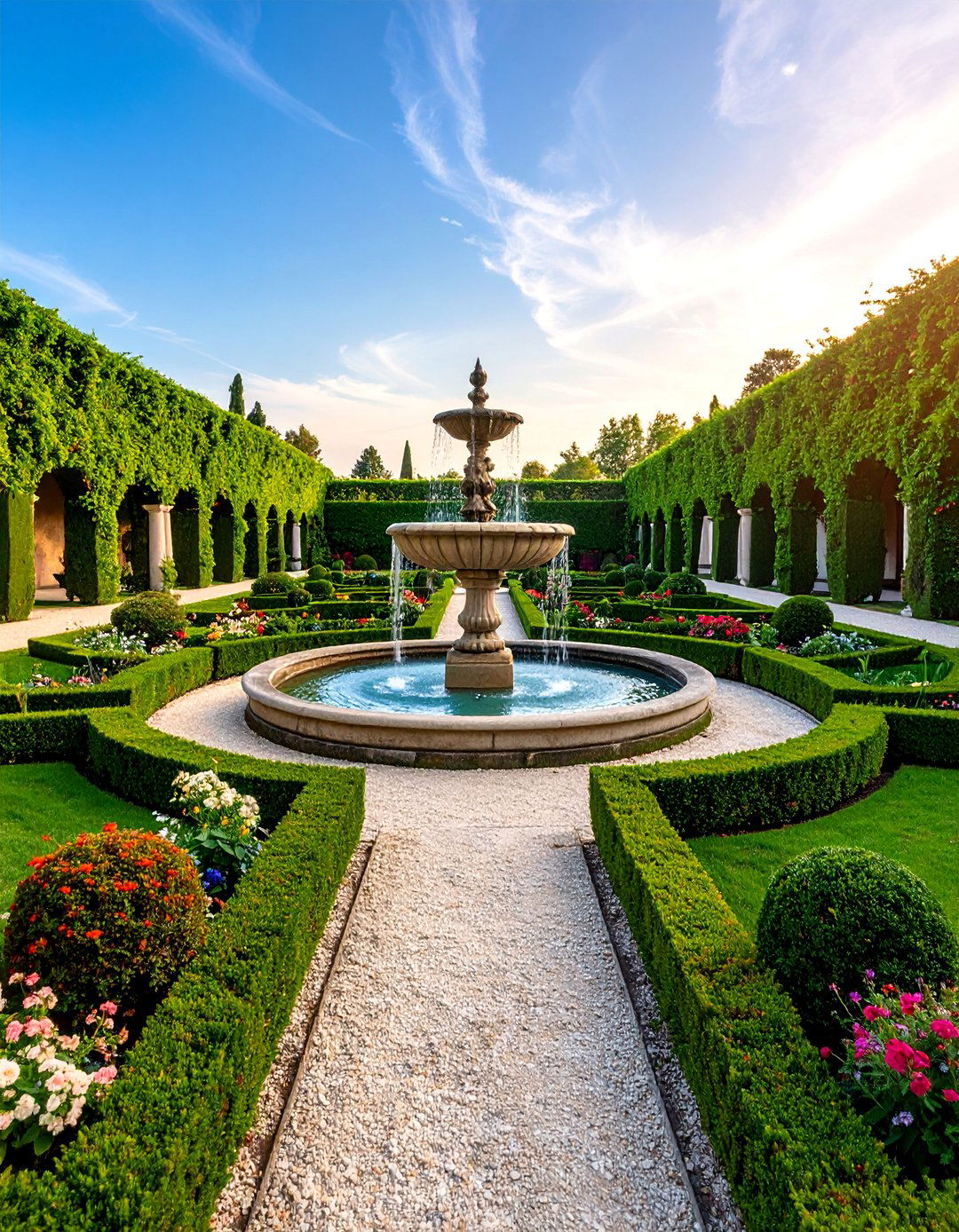

Leave a Reply